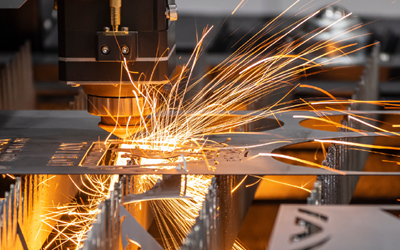Surviving the retirement wave: Can AI-powered talent intelligence revitalise the manufacturing workforce?
The retirement wave poses risk to the future manufacturing workforce. AI-powered talent intelligence can help fill coming skills gaps and usher in industry 4.0.

Table of Contents
Australian manufacturing is at a pivotal moment. Recent Census data highlights a sharp decline in its workforce, with a loss of over 219,000 workers in the past five years.1 Looking ahead, projections indicate that the industry could see a further reduction of 23,100 jobs in the next half-decade.2
The looming retirement wave of baby boomers threatens to intensify this workforce scarcity, potentially leading to delayed projects, quality concerns, and an overburdened workforce. And the technological shift within the sector further complicates matters as the demand increases for tech-savvy individuals over those with traditional manufacturing skills.
Could talent intelligence be exactly what's needed to breathe new life into a struggling manufacturing workforce amid this shifting landscape?
The art of engineering talent in manufacturing 4.0
Talent intelligence is a modern approach to HR that leverages data, analytics, and advanced technologies such as artificial intelligence (AI) to make more informed decisions about talent acquisition, management, development, and retention. It's a multifaceted strategy that enables companies to gain deep insights into the talent market, understand the current workforce capabilities, and predict future needs.
Talent intelligence in manufacturing goes beyond just filling positions. It’s about creating a dynamic, skilled workforce that can adapt to the ever-changing landscape.
- Skill-based hiring: In the manufacturing sector, aligning skills to specific roles is crucial. Advanced algorithms can fine-tune the recruitment process, ensuring candidates possess the precise skills needed for specialised manufacturing roles such as machine operation, quality control, or production management.
- Seamless onboarding for operational efficiency: In manufacturing, where every second on the assembly line counts, the fast integration of new hires is vital.
- Data-driven reward systems to enhance retention: Given the importance of retaining skilled workers, compensation is crucial to get right. Programs that are informed by robust data help maintain a satisfied and engaged workforce.
- Proactive succession planning: Pinpointing and developing internal talent for pivotal roles ensures that the production line never halts. Effective succession planning is crucial for the continuity of operations, especially in specialised areas such as supply chain management or engineering.
Does manufacturing need a makeover? Redefining the sector through better employer branding
The perception of manufacturing as an outdated industry is a significant barrier to attracting the fresh talent required to combat the impending wave of retirees.
Employer branding emerges as a crucial strategy to shift this perception and depict manufacturing companies as leaders in innovation, champions of sustainability, and pioneers of the new industrial revolution.
A positive and impactful onboarding process also significantly influences a new employee's perception of the employer brand. Talent intelligence platforms can streamline the onboarding journey, ensuring it is efficient, engaging, and reflective of a company's commitment to its workforce. When new hires, particularly from younger generations, experience a seamless integration into their roles, it reinforces the message that the company is not just keeping pace with the times but is actively shaping the future of manufacturing.
Talent intelligence can also amplify the employer brand by showcasing the company's investment in the growth and development of its employees. Through learning recommendations, career planning tools, and succession planning insights, these platforms demonstrate a commitment to employee progression. This is critical for younger workers who prioritise personal and professional development when choosing an employer.
Skills: The importance of upskilling, reskilling, and forecasting
In the face of a tightening labour market and a sharp decline in traditional manufacturing skills, identifying and nurturing the right talent has never been more critical. The challenge is twofold: finding individuals with existing skills in an increasingly competitive landscape and equipping current employees with the capabilities required for tomorrow's manufacturing environment.
Talent intelligence platforms serve as an indispensable tool in this challenge, enabling a precision-driven approach to skills matching. By leveraging advanced algorithms, these platforms can sift through the labour market, pinpointing candidates whose skill sets are aligned with the specialised needs of manufacturing roles. This technology doesn’t just match names to job descriptions but intricately aligns proficiencies to the nuanced demands of the industry.
The rapid pace of technological advancement has shifted the skill profile needed in manufacturing, and the pool of individuals with these modern competencies is remarkably shallow. In response, forward-thinking manufacturers are investing in reskilling and upskilling initiatives. These programs are designed to mould their existing workforce into a modern one, capable of handling advanced machinery, robotics, and data analytics. Talent intelligence platforms can inform these initiatives, highlighting the specific skills that need development and providing personalised learning pathways.
In an industry that must stay nimble to thrive, understanding not only the current skills landscape but also forecasting future needs is crucial. Talent intelligence technology offers a window into the future of the workforce. It enables companies to anticipate the evolution of skills requirements and respond proactively. By analysing workforce data, these platforms can predict skill shortages and guide strategic decision-making in hiring, training, and workforce development.
Paving the way for Industry 4.0
Talent intelligence isn’t just about navigating the here and now. It’s about steering manufacturing into the future. It empowers companies to build a workforce that is as resilient as it is skilled.
As manufacturers start to harness the full potential of talent intelligence, they're not only addressing the immediate skills gaps but are also shaping a workforce that's future-ready, agile, and equipped to handle the technological advancements of Industry 4.0.
[1] Latest Census data: How Australians learn, work & commute, McCrindle Research, October 2022.
[2] Manufacturing, Labour Market Insights, Australian Government, June 2022.
You may also like:
Ready to get started?

